The North Korea crisis can’t be fully addressed by pressure and military brinksmanship alone, nor by the United States alone. Thankfully, top diplomats from the United States and Canada are seeking wider input around the North Korea issue. The so-called “Vancouver Group” offers an opportunity for countries around the world to discuss additional efforts to pressure North Korea and to develop creative diplomatic ideas. U.S. Secretary of State Rex Tillerson and the other foreign ministers of the Vancouver Group should take advantage of the opportunity to think outside the box.
What is the Vancouver Group?
Tillerson and Canadian Foreign Minister Chrystia Freeland will hold a meeting in Vancouver on January 16 to discuss North Korea’s (or DPRK) nuclear program. The countries invited to join this “Vancouver Group” include Australia, Belgium, Britain, Colombia, Ethiopia, France, Greece, Luxembourg, the Netherlands, New Zealand, the Philippines, South Africa, Thailand, and Turkey. Other invited participants include South Korea, Japan, India, and Sweden. The attendance of Japan and South Korea would be particularly important in light of their historical engagements and proximity to the DPRK. Likewise, China and Russia, two countries that engaged in the previous six-party talks and play an important role in the North Korea nuclear weapons issue, should be involved as well. While Freeland seeks a separate meeting with China and Russia in Vancouver, such a meeting at this point remains uncertain.
At a December 19 press conference announcing the meeting, Tillerson said the countries will discuss how to improve the effectiveness of existing pressure on the DPRK to come to the negotiation table and how to strengthen pressure the DPRK to denuclearize with an agreed verification process. They’ll also discuss how to prepare for the prospect of talks with Pyongyang. Freeland, for her part, remarked that the Vancouver Group is part of an “aggressive diplomatic campaign,” stressing that a diplomatic solution is essential and possible.
President Trump has, for his part, called into question via Twitter the utility of diplomacy with North Korea. Nonetheless, Tillerson insisted that the White House’s efforts have always been a campaign of “sanctions and diplomatic pressure.” He said the White House has not rejected diplomatic talks and has always been committed to finding a peaceful path to denuclearization.
Wanted: Creative thinking
In an article I wrote in early November 2017, I argued that the DPRK nuclear program is not a challenge that Washington should address alone. Any threat to use nuclear weapons affects the entire globe (something Freeland has emphasized herself, and Canadian leaders of course realize that a North Korean missile could reach Canada), and as a result, more countries should be involved in generating ideas for resolving the impasse. Freeland floated the idea of leveraging Canada’s relationship with Cuba, for instance, acknowledging that the DPRK may be more trusting of Cuba than it is of other countries. Whether North Korea would listen to Cuba regarding nuclear weapons may be a long shot, and Cuba is not one of the countries invited to the Vancouver meeting. However, considering other approaches to addressing the North Korea nuclear weapons issue and what other options might be possible would be most valuable at the Vancouver discussions.
China and Russia—which supported recent U.N. Security Council sanctions against North Korea, but which also continue to promote a path to negotiations—are crucial players, of course, in any diplomatic efforts. China is concerned that Washington overly-focuses on penalties and continues to urge the United States to scale back its military exercises on the Korean Peninsula. Like many other countries, leaders in Beijing stress that there is no real military option for resolving the North Korea nuclear issue. Russian Foreign Minister Sergei Lavrov, likewise, has said that no one wants to see war in the region, and in December Russia offered to lead talks.
The Vancouver Group should specifically discuss what the international community may be willing to negotiate in return for a DPRK agreement to come to the negotiating table and stop its nuclear weapons program. For instance, North Korea offered to suspend its nuclear and missile testing if the United States and South Korea suspend joint military exercises on or near the Korean Peninsula. On January 4, the United States announced that it will delay its military exercises until after the Winter Olympics. Another question is whether the United States and others can live with a North Korea that “freezes” but still keeps its nuclear weapons and missiles, even if those weapons are not developed any further. However, more directly relevant to the discussions are issues regarding missile defense. It might make sense to consider a moratorium during negotiations on nuclear and missile testing.
Finally, what additional issues should be addressed in negotiations with the DPRK? The reported North Korean biological and chemical weapons programs are of concern to the international community, for one, as are its cybersecurity capabilities and its large conventional force. There are other outstanding matters of concern regarding DPRK behavior, such as reported illicit trafficking of North Korean shipments to a Syrian government agency responsible for the country’s chemical weapons program. There have also been reported prohibited ballistic missile and conventional arms cooperation between Syria and the DPRK. The Vancouver Group provides a platform to discuss other security issues emanating from the country.
Giving Diplomacy a Chance
The participants at Vancouver will face the difficult task of finding new ways to pressure North Korea. The U.N., United States, and members of the former six-party talks have made various attempts to convince the DPRK not to develop a nuclear weapons program. There is no guarantee that the Vancouver meetings will break new ground. Few countries have any contact with the DPRK, which limits diplomatic alternatives. Exacerbating matters are rumors regarding Tillerson’s future as secretary of state. Yet another stark challenge is America’s own posture—in the recent National Security Strategy, the White House writes: “Nuclear weapons have served a vital purpose in America’s National Security Strategy for the past 70 years. They are the foundation of our strategy to preserve peace and stability.”
Nevertheless, the Vancouver meeting is an opportunity for increased diplomacy on this seemingly-intractable issue—in particular, including other countries into this discussion is a welcome step forward. Countries can bring their lessons learned: For example, South Africa gave up its own nuclear weapons program; the U.K., France, and Germany took part in the Iran nuclear agreement; Sweden has diplomatic ties with the DPRK; and Australia, South Korea, and Japan are all key actors in the Asia Pacific region. At the end of the day, while diplomacy certainly has its challenges, there is little appetite in the international community for military action against the DPRK. Diplomacy must be given a chance. As Mr. John Baird, former minister of foreign affairs in Canada has said, “there isn’t any winner in a kinetic response.”
The Brookings Institution is committed to quality, independence, and impact.
We are supported by a diverse array of funders. In line with our values and policies, each Brookings publication represents the sole views of its author(s).

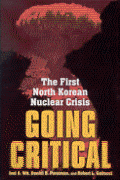
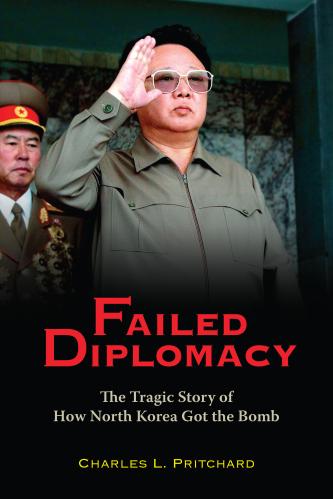
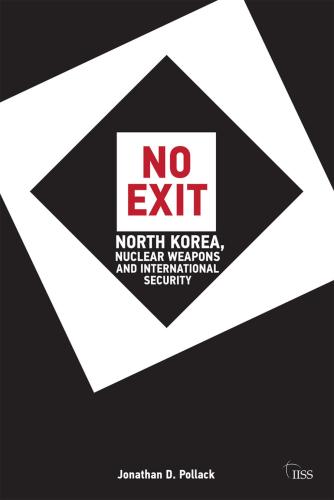
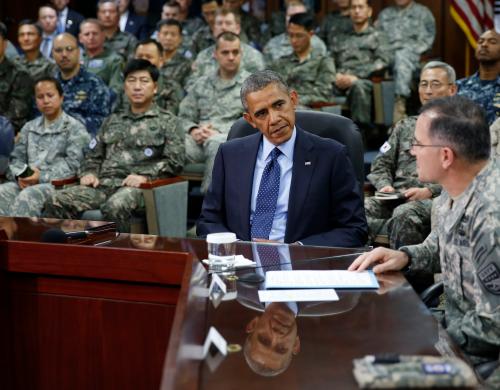



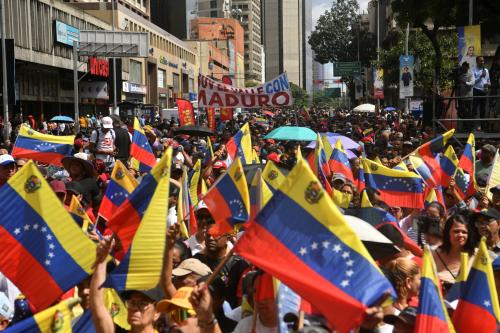
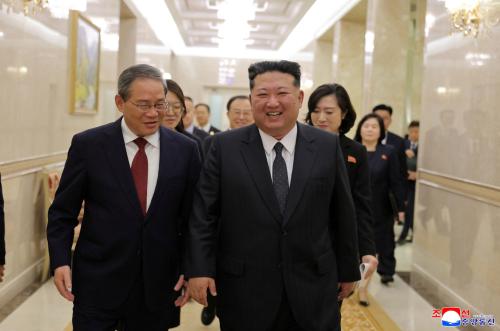
Commentary
Another opportunity for diplomacy on North Korea
January 8, 2018